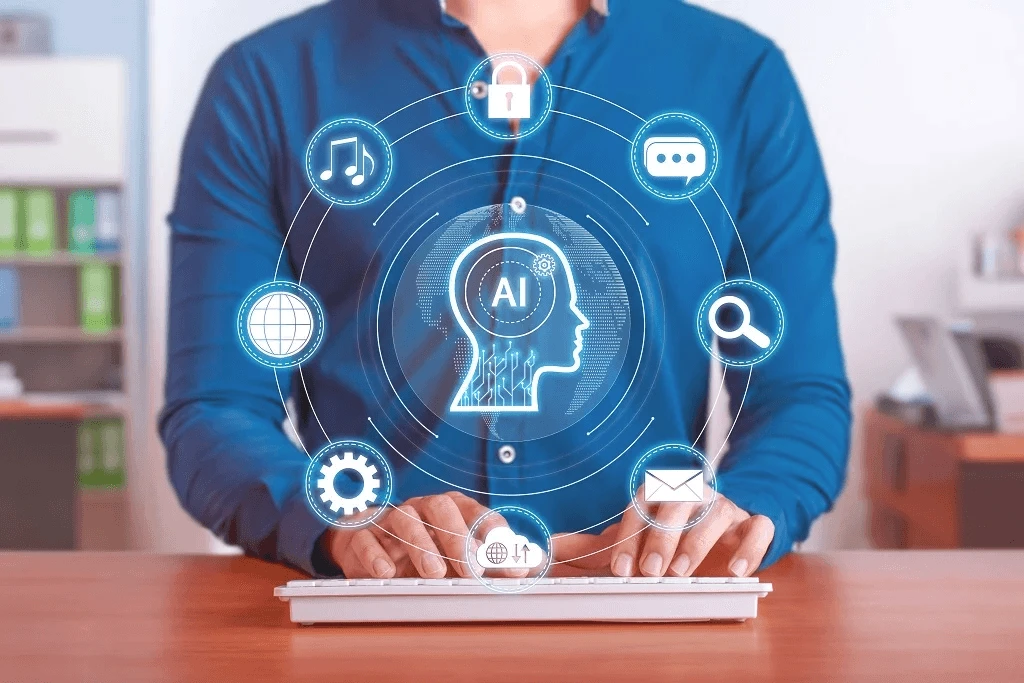Artificial Intelligence (AI) is revolutionizing the outsourcing industry, transforming how businesses operate and deliver services. At Outsource Philippines, we’ve witnessed firsthand the profound impact of AI in outsourcing on productivity, efficiency, and customer satisfaction.
This blog post explores the key ways AI is reshaping outsourcing services, strategies for adapting to this new era, and the challenges and opportunities that lie ahead. We’ll provide practical insights to help you navigate the AI-driven outsourcing landscape and stay competitive in this rapidly evolving field.

How AI Transforms Outsourcing Services?
AI revolutionizes the outsourcing industry, creating new opportunities for efficiency and innovation. This transformation impacts various aspects of outsourcing services, from task automation to customer service enhancement.
Automation of Routine Tasks
AI significantly impacts outsourcing through the automation of repetitive tasks. Deloitte’s report explores findings on generative AI trends, business impacts, and challenges throughout 2024. This automation allows human workers to concentrate on more complex, value-added activities.
In data management services, AI-powered tools automatically categorize and tag incoming documents, reducing manual labor by up to 80%. This acceleration of processes also minimizes human error, leading to more efficient operations.
Enhancement of Data Analysis
AI processes vast amounts of data quickly and accurately, transforming how outsourcing providers deliver insights. Machine learning algorithms identify patterns and trends that humans might overlook, resulting in more informed decision-making.
A McKinsey study found that companies using AI-powered analytics experienced a 15-25% increase in their marketing return on investment (ROI). This statistic demonstrates AI’s potential to drive tangible business results through improved data analysis capabilities.
Revolution in Customer Service
AI-powered chatbots and virtual assistants transform customer service outsourcing. These tools handle a large volume of customer inquiries 24/7, providing instant responses and allowing human agents to focus on more complex issues.
Gartner predicts that by 2025, 80% of customer service and support organizations will be applying generative AI technology in some form. This shift improves response times and leads to significant cost savings for businesses (while maintaining high-quality customer support).
Improvement in Quality Control
AI makes significant strides in quality control and predictive maintenance. In manufacturing outsourcing, AI algorithms analyze data from sensors to predict equipment failures, enabling proactive maintenance and reducing downtime.
A PwC report estimates that AI-powered predictive maintenance increases productivity by up to 20% and reduces maintenance costs by up to 10%. These improvements contribute to more efficient and cost-effective outsourcing operations.
As AI continues to evolve, its impact on outsourcing services will only grow. The next section explores how businesses can adapt their outsourcing strategies to thrive in this AI-driven era.

How to Adapt Your Outsourcing Strategy for AI
The rise of AI in outsourcing demands a strategic shift in how businesses approach their partnerships and operations. To stay competitive, companies must evolve their outsourcing strategies to leverage AI’s potential while addressing its challenges.
Invest in Continuous Learning
The rapid advancement of AI technology requires a workforce that can adapt quickly. More than 600 million people around the world are set to be reached by the World Economic Forum’s Reskilling Revolution platform by 2030.
To address this, create a robust training program that focuses on both technical AI skills and soft skills like critical thinking and problem-solving. Encourage your outsourcing partners to do the same. For example, IBM’s AI Skills Academy offers courses on AI fundamentals, machine learning, and data science, which can serve as a model for internal training programs.
Integrate AI Tools Seamlessly
Integrating AI tools into existing processes is essential for maximizing efficiency. Start by identifying areas where AI can have the most significant impact. For instance, in customer service outsourcing, implementing AI-powered chatbots can automate up to 70% of customers’ requests, freeing up human agents for more complex issues.
When integrating AI, ensure you have a clear implementation plan. A survey by NewVantage Partners revealed that 77% of businesses report that business adoption of big data and AI initiatives continues to represent a challenge. To overcome this, involve all stakeholders in the integration process and provide comprehensive training on new AI tools.
Shift Focus to High-Value Tasks
As AI takes over routine tasks, redirect your outsourcing efforts towards high-value, complex activities that require human expertise. For example, instead of outsourcing basic data entry, focus on data analysis and strategy development.
A report by Deloitte found that 60% of organizations use AI to move to higher value-added offerings. This shift not only maximizes the value of your outsourcing partnerships but also helps future-proof your operations against further AI advancements.
Develop Effective AI-Human Collaboration
The future of outsourcing lies in effective collaboration between AI and human workers. Develop models that leverage the strengths of both. For instance, in content creation, AI can generate initial drafts or ideas, while human writers refine and add creative elements.
McKinsey reports that companies that effectively combine human and AI capabilities could double their cash flow by 2030. To achieve this, clearly define roles and responsibilities between AI systems and human workers in your outsourcing partnerships.
Adapting your outsourcing strategy for the AI era requires more than just implementing new technologies. It demands a complete reimagining of your approach to outsourcing. The next section will explore the challenges and opportunities that arise from this AI-driven transformation in the outsourcing industry.

Navigating AI Outsourcing Challenges
1. Data Security in AI-Driven Outsourcing
Data security stands as a paramount concern in AI-driven outsourcing. Breached data stored in public clouds incurred the highest average breach cost at USD 5.17 million, underscoring the critical need for robust security measures. Companies must implement end-to-end encryption for all data transfers and storage. Regular audits of AI systems and outsourcing partners’ security protocols are essential. Federated learning techniques offer a promising solution, allowing AI models to train on decentralized data and reducing the risk of large-scale breaches.
2. Manage Implementation Costs
The initial costs of AI implementation in outsourcing can be substantial. However, long-term benefits often outweigh upfront expenses. AI has potential to increase corporate profitability in 16 industries by an average of 38 percent by 2035. To manage these costs effectively, companies should start with small-scale pilot projects before full-scale deployment. Prioritizing AI implementations in areas with the highest potential ROI (such as customer service automation or predictive maintenance in manufacturing outsourcing) can yield significant returns.
3. Workforce Transitions in the AI Era
AI-driven automation leads to job displacement in some areas while creating new roles in others. The World Economic Forum predicts that 85 million jobs may be displaced by 2025, but 97 million new roles may emerge. These new positions will adapt to the new division of labor between humans and machines. Companies must focus on reskilling and upskilling their workforce to navigate this transition successfully. Developing training programs that equip employees with AI-related skills (data analysis, machine learning, and AI ethics) is crucial. Creating new roles that leverage human creativity and emotional intelligence alongside AI capabilities will ensure a smooth transition.
4. Ethical Considerations in AI Outsourcing
The use of AI in outsourcing raises important ethical questions. Companies must address issues such as algorithmic bias, transparency in decision-making processes, and the responsible use of AI technologies. Establishing clear ethical guidelines and ensuring compliance across all outsourcing partnerships is essential. Regular audits and assessments of AI systems for potential biases or unintended consequences should become standard practice.
5. Adapt to Rapid Technological Changes
The fast-paced evolution of AI technologies presents a constant challenge for outsourcing providers and their clients. Staying current with the latest advancements and understanding their potential applications is crucial for maintaining a competitive edge. Companies should invest in continuous learning programs for their staff and foster a culture of innovation. Collaborating with research institutions or tech partners can help organizations stay at the forefront of AI developments in the outsourcing industry.

Leveraging AI for Optimal Outsourcing Results
AI has revolutionized outsourcing, ushering in a new era marked by enhanced efficiency, innovation, and strategic alliances. Companies that effectively utilize AI in outsourcing gain substantial advantages, such as greater productivity, cost reductions, and better customer satisfaction. Yet, this shift also introduces challenges, including data security, implementation costs, and workforce adjustments.
Looking ahead, AI’s role in outsourcing promises exciting developments, such as advanced automation, predictive analytics, and more personalized services. We anticipate the creation of new roles that combine human skills with AI capabilities. Businesses that embrace AI as a tool to enhance human performance will be well-positioned for future success in the outsourcing industry.
As AI continues to advance, its integration into outsourcing will likely set new industry standards and reshape expectations. Organizations that adopt AI-driven strategies will be better equipped to predict market trends, streamline operations, and make informed decisions. This progress will also lead to a more agile workforce, where continuous learning and adaptation are essential. By fully leveraging AI, businesses can unlock growth opportunities and stay competitive in an increasingly digital landscape.
Maximize Your Business Potential with AI in outsourcing
AI is transforming the outsourcing industry, bringing greater efficiency, productivity, and innovation. By automating routine tasks, enhancing data analysis, and revolutionizing customer service, AI enables businesses to focus on high-value activities. To stay competitive in this rapidly evolving landscape, it’s essential to adapt your outsourcing strategy to leverage AI effectively.
Leading this shift, we offer tailored solutions that harness the power of AI to deliver real results. Outsource Philippines is dedicated to helping your business elevate its performance and stay ahead of the curve. Contact us today to discover how our top-notch outsourcing services can be customized to meet your unique needs.










